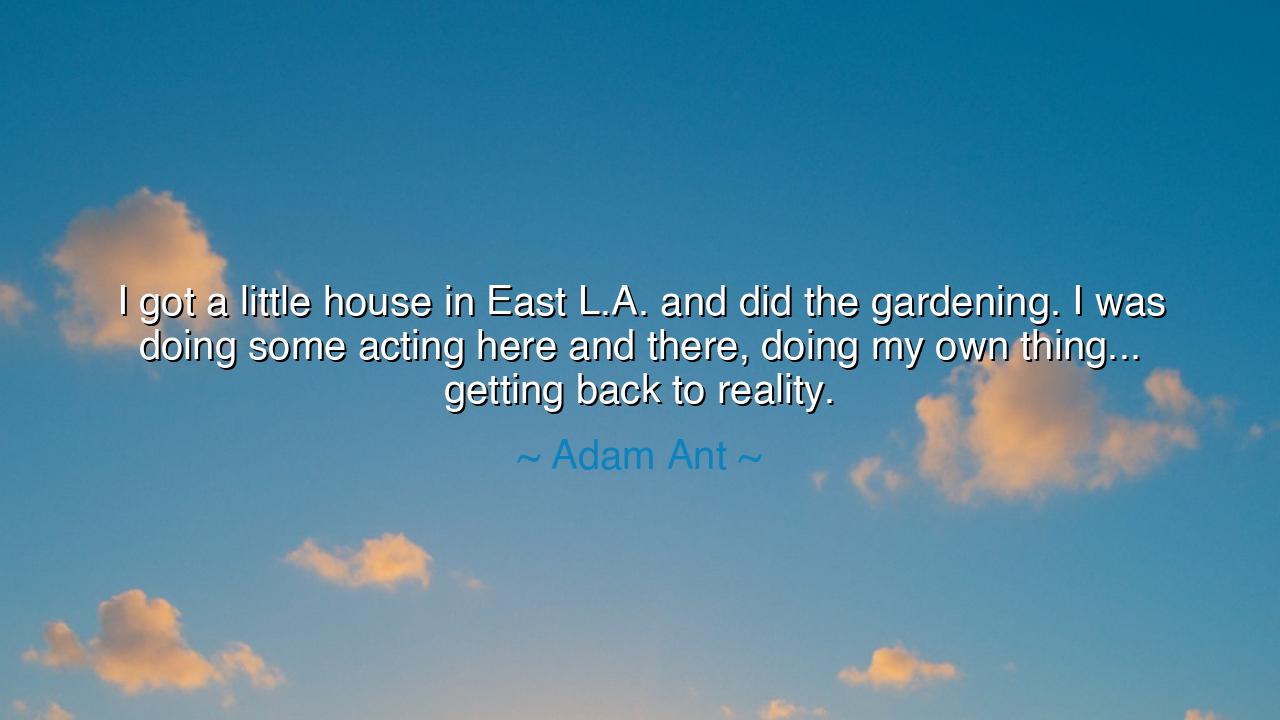
I got a little house in East L.A. and did the gardening. I was
I got a little house in East L.A. and did the gardening. I was doing some acting here and there, doing my own thing... getting back to reality.






“I got a little house in East L.A. and did the gardening. I was doing some acting here and there, doing my own thing... getting back to reality.” Thus spoke Adam Ant, the artist once crowned in the glitter of fame, who descended from the stage’s roaring lights to the quiet soil of everyday life. In these few words lies a truth as old as the rise and fall of empires: that fame is a mirage, and that true peace is found not in the applause of the crowd, but in the simple rhythm of honest work and ordinary living. What he calls “getting back to reality” is not defeat, but awakening — the rediscovery of the self beneath the mask of performance.
The origin of this quote comes from a man who had seen both the heights of adoration and the depths of exhaustion. Adam Ant, once a dazzling figure of the 1980s music scene, lived in a world of relentless glamour, performance, and expectation. But in time, the noise grew too loud, and the light too blinding. Seeking refuge from the illusions of fame, he retreated to a small house in East Los Angeles, where he took up the humble work of gardening, acting, and reflection. To many, this might have seemed a fall from greatness — but to him, it was a return to wholeness. For in the soil, in the quiet labor of one’s own hands, he found again what the stage had taken from him: reality, humility, and peace.
To “do the gardening” may seem a small act, yet it is, in truth, a sacred one. The gardener works with the elements, guided by patience, grounded in the present. Every seed planted is an act of faith; every weed pulled, an act of renewal. In returning to the earth, Adam Ant was returning to the ancient wisdom of the body and the spirit — a wisdom known to the philosophers and mystics of old. The Stoics spoke of it as alignment with nature, the Buddhists as mindfulness, and the poets as living simply. All of them, in their own tongues, proclaimed that when the soul is wearied by illusion, the only cure is to touch the real — the soil, the sky, the self.
There is something profoundly heroic in this descent from grandeur to simplicity. History remembers many who, after attaining greatness, turned away from power to seek truth. Consider Marcus Aurelius, emperor of Rome, who governed the vast empire but found his truest peace not in the throne, but in the meditations he wrote for himself — quiet reflections on virtue, humility, and the transient nature of glory. Like Adam Ant, Marcus sought not escape, but grounding — the reminder that beneath the robes of authority, a man is still only a man, and must live in harmony with himself. Both men understood that to rule the world is easy; to rule the heart is the true victory.
When Adam Ant speaks of “doing my own thing,” he points to another lesson — that life’s worth is not measured by status, but by authenticity. The world often demands performance: to play roles, to wear masks, to fit the script that others write for us. But when those performances end, one must ask: Who am I when the lights go out? By choosing to act only “here and there,” to work in his garden, and to live quietly, he reclaimed the right to live by his own rhythm. His return to reality was not an abandonment of art, but a purification of it — art reborn not from vanity, but from truth.
There is also humility in his words — the acknowledgment that life’s true rewards lie not in excess, but in balance. The little house in East L.A. symbolizes not limitation, but freedom. It is the dwelling of one who has chosen enough — enough space to live, enough work to sustain, enough beauty to inspire. It is the wisdom of the middle path, praised by the philosophers of old: to live neither in excess nor deprivation, but in harmony with what is. To garden is to participate in the cycle of creation itself — to labor, to rest, to watch things grow and fade. In such cycles, man rediscovers his place in the grand rhythm of the universe.
Therefore, my child, learn from Adam Ant’s journey. When the noise of the world grows deafening, when you feel yourself lost amid ambition and expectation, do as he did: return to the garden. It may not be a garden of earth; it may be the garden of your craft, your home, your quiet passions. But tend it. Water it with patience, prune it with care, and watch as it brings you back to the essence of life. For to “get back to reality” is not to retreat — it is to advance toward what is eternal. The soil does not deceive; the heart does not lie.
And remember this: greatness without grounding is emptiness, but simplicity with awareness is glory. Seek not the world’s applause, but the world’s truth. For as Adam Ant discovered, the truest stage is not the one before the crowd, but the one within the soul — and the finest performance of all is the quiet, steadfast act of being real.






AAdministratorAdministrator
Welcome, honored guests. Please leave a comment, we will respond soon